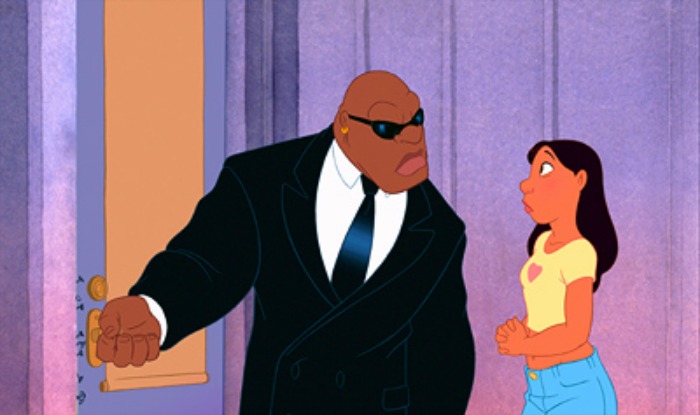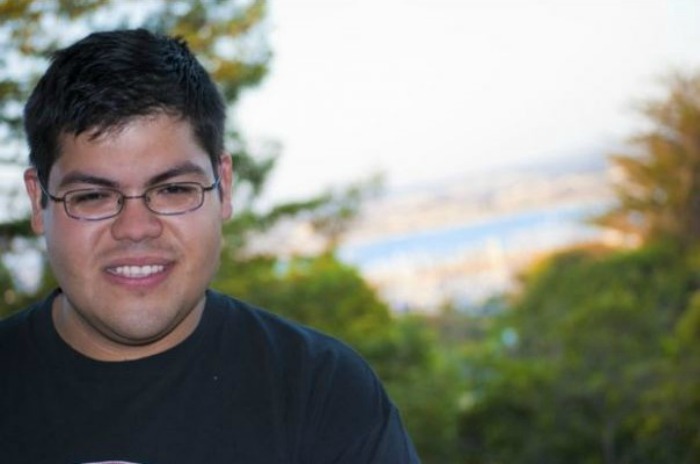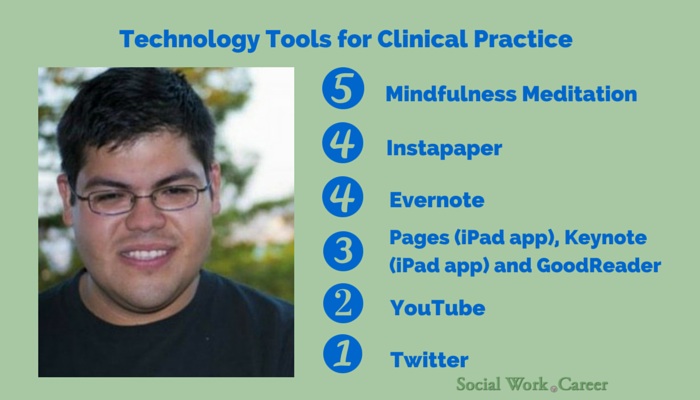Are you interested in applying some technology tools in your clinical work with clients?
To learn more about the application of tech tools within the mental health field, I reached out to Ignacio Pacheco, MSW (also known as Iggy). Iggy is the editor and creator of the Social Work Tech Blog, a blog dedicated to integrating technology tools in practice.
Iggy, Could you share with us what made you decide to become a social worker?
I saw “Lilo and Stitch” and was inspired to be like Cobra Bubbles, the social worker…

Actually, I spent a summer in Detroit, MI as an intern union organizer and I was driving to different caregiver homes to recruit them. They didn’t train the interns and I made the most of my experience by engaging with those whose homes I visited and listening to their stories about how they were not being fairly compensated by the state for their hard work. As my introduction to social justice, it was both uplifting and sad.
I am a social worker because I believe in social and economic justice. Quiet frankly, injustice makes me angry but I believe that this energy helps to feed my passion in the work that I do. I like being a social worker because I like connecting with people and using my skills and knowledge to help clients empower themselves to make the best of their situations.
Based upon your Social Work Tech Blog, you seem to be particularly interested in the application of technology with social work practice. Were you always fond of technology? When/how did this interest first start?
I think I’ve always been a fan of technology and music – they were both intertwined. In middle school, I was the geek with the Walkman (cassettes!!!). In high school, I had a livejournal and a separate blog on Geocities that served as my listing page when I was a part of the tape-trading community for Phish and Dave Mathews shows. The various music list-serves were as meaningful to me as Twitter is now.
As for technology tools, I was blown away by the first iPod and bought my first devise in its third iteration and I spent many nights of my college career curating and acquiring my music and media collection.When the iPhone was introduced, I immediately saw the potential of awesomeness that came from carrying a mini-computer in one’s pocket. As that devise evolved and Apple allowed for developers to develop apps (i.e., software), the potential for being creative and delivering information simply exploded.
When the iPad was introduced, I had a similar reaction: Hitler’s angry reaction to the iPad . I warmed up to the fact that many developers who had made awesome apps on iPhone were going to make full-size optimized iPad apps. Apple has done a good job luring and supporting the creativity of developers. As evidenced by my blog, I love the apps on iOS devices.
What would you say are the 5 most useful tools for clinical work that you have found to date?
5. Mindfulness Meditation: Mindfulness Meditation has helped me to stay grounded and address some of my own challenges. I took a course offered by my place of employment and it changed my life. I try to instill the practice into my clients.
After introducing my clients to mindfulness meditation and concepts such as being grounded, present and allowing thoughts to flutter away, I find that that they react as I have – cleansed. I rely on the Simply Being five-minute meditation application to lead my clients in meditation and if the clients have bought in to the intervention, they have all reported a significantly lower anxiety level.
4. Instapaper: I use this free service on the go to read articles later that you or other people post on Twitter that I can’t read at the moment I am using Twitter. There are wonderful articles that I stumble over (and many of which, you share, Dorlee) that I *have* to read later!
4. Evernote: I love using Evernote to forever save articles that I enjoy reading. Sometimes I make those articles into handouts for my clients. I also use it to take notes and to plan out other aspects of my life, social work related or not. Every part of my personal and professional development is on Evernote so that if my house burns down, they are out in the cloud externally.
3. Pages (iPad app), Keynote (iPad app) and GoodReader: I use all three of these apps for psychoeducation. Pages allows one to make very good handouts (see: Evernote), Keynote to make psychoeducational presentations (e.g. for Domestic Violence, boundary development, anger management), and GoodReader to hold some of my other multimedia files (such as video) to enhance my therapy sessions (e.g. I have a movie on Domestic Violence and Trauma).
2. YouTube: A great resource to find psychoeducation on various topics. The other day, I pulled up a cartoon to help a client understand Borderline Personality Disorder (BPD), which was something my client described in a loved one. There are other good tools that social workers can use to normalize, validate or empower their clients.
1. Twitter: I wish more social workers would embrace Twitter. For me, linking up to various entities (e.g. @NAMICommunicate, @PsychologyToday, @twola) and people (You, @SWcareer, @DrHubaEvaluator, @njsmyth, @LovEternal) really empowers me to validate the work that I am doing and makes me want to work harder to empower others in the work that they do.
What is your current position and what do you enjoy most about it?
I have two positions. I am a transitional case manager at a local homeless agency and a clinical social worker (i.e., brief-therapy psychotherapist) at a college campus. Both allow me to be creative in formulating meaningful interventions for the purposes of psychoeducation and skill building.
I absolutely love my clinical job, as I have very supportive and strong women shaping me into the leader I want to be. My non-supervisor colleagues are very wonderful people to learn from as well.
What aspect(s) of your work do you find most challenging?
What is most challenging for me is managing my time. I have decided that I am going to take care of myself and not put undue stress on myself for my other creative endeavors. What this means is less frequent updates to SocialWorkTech Blog.
The problem I find with updating the site is that I want to hit a home run every time I update it. I have been using Evernote to document my ideas and have been slowly developing pieces that then get the full blog post treatment.get the full blog-post treatment.
It is quite commendable that you are already fully employed. Many of my peers who graduated in May are still looking for work. What job search advice would you offer to recent graduates looking for employment?
There is a quote that I saw in Tim Feriss’ new book that goes “For a long time, I’ve known that the key to getting started down the path of being remarkable in anything is to simply act with the intention of being remarkable”. I wrote it down in my personal journal and reflect on it from time to time. I believe that this mantra is what helped me to land a job when looking.
To me, being remarkable means using your strengths for good, honoring yourself, being modest, and being ethical. I’m sorry for going back to my website, but what makes me unique in the field (for better or for worse) is the way I use technology to try to help others.
If it means pulling out my iPad because I have a killer PDF in my Social Work Tool Box/Kit, putting in a bunch of hours into a psychoeducation (my favorite!) presentation, and putting many hours of thought into the ethical considerations surrounding a concept that I am teaching my colleagues (through my site) about the awesome things I am doing, then I am happy. My current employers both saw the passion and dedication I have to both, the field and aspects of myself that apply to the field.
So my advice to recent graduates is to find your passion, follow it, and no matter how crazy/radical people think you are, you will be in the right place when you have colleagues that embrace your passion.
Thanks so much, Iggy, for sharing with us some of your tech secrets of the trade 🙂 You may wish to follow Iggy @SWTechBlog for additional great technology-related information. Also, take a peek at his Digital Resume. It’s a terrific example of what an upcoming graduating (or recently graduated) social worker may want to put together for their job search.
What questions/comments do you have on the application of technology tools to clinical practice? Have you thought and/or used any of the tools suggested?
You May Also Enjoy:
Finding technology’s role in the counseling relationship (Counseling Today)




Thanks for this interesting post. I am a big fan of technology and its efficiencies.
What I find curious, Iggy, is that you haven’t mentioned the use of any applications or games as techniques for motivating patients or keeping a log on their progress in terms of mood etc.
Are there any such tools that you have used so far that have proven helpful?
As with everything I do in clinical practice, I look at everything from an ethical perspective: Is [intervention] clinically beneficial to the client? Am I well-grounded or familiar-enough with [intervention] to be able to confidently refer my client to it?
The only media I ever ask clients to acquire are books or DVDs if I think they are clinically appropriate, as these are typically accessible. For example, the movie “Enough” is about Jennifer Lopez’s character suffering domestic violence, showing common characteristics of it and that it transcends socio-economic status, and ultimately shows how she persevered over her situation. Practically, this normalizes this experience of going through domestic violence (to some extent) but clinically, it may be inappropriate with a client who suffers from severe PTSD due to having experienced DV.
I refrain from recommending apps to my client as advanced technology is not always accessible, due to economic or learning disparities between the clinician and client. The only apps I have used in the work that I do are those that access interventions, specifically PDFs or iPad compatible video. For clients that have previously asked, I have recommended the Meditation Oasis Simply Being Application, but I have grown out of relying solely on the app to guide meditations (as I have previously) and can now do these on my own.
I don’t record client information on my iPad because I am very uncomfortable carrying this information around with me, although I have carried around process recordings before. The only thing I use to keep a log of my client’s progress is my handwritten notes that I keep locked up. Some things have to stay “old school”.
I hope this has helped!
Thanks. I didn’t consider the economic and learning barriers although I should have in our field of social work 🙂
Ignacio,
Thanks for sharing all these helpful tips.
I have a question for you about your mindful meditation practice. I’ve heard many people talk (only) about the positive benefits of this but no one seems to mention the fact that it may also cause unpleasant feelings or emotions to arise…
May I ask you whether you had this experience of having anxiety or other negative feelings come up for you and if so, how did you deal with it?
For clients, I do an abbreviated lesson on mindfulness and due to the fact that many of my clients focus on their breath and are asked to consider acknowledging their thoughts before they “flutter away”, they tend to respond postively.
The unpleasant feelings that have come up for me during a meditation of this type are increased anxiety and feeling an increase of my blood pressure as a byproduct of the increased anxiety. When this has happened, it is usually within the first three minutes of my meditation and I acknowledge the tension that I am feeling. I also acknowledge that I am in control and that these feelings will pass as I focus on being present and the soothing voice (Meditaiton Oasis’ “SimplyBeing” app) that is leading the meditation. Typically, I come out of the meditation with aforementioned symptoms diminished.
When negative emotions come present, I may acknowledge them and try my best to “let them go” as the guided meditaiton instructs me to. I let myself stay grounded to the present and allow myself to feel what I need to feel as I move forward with the meditation.
I hope that helps answer your question 🙂